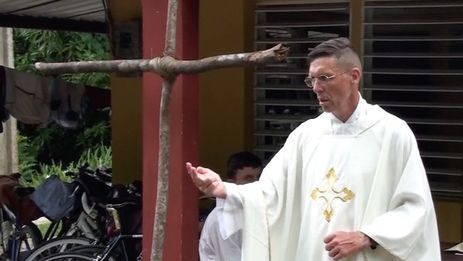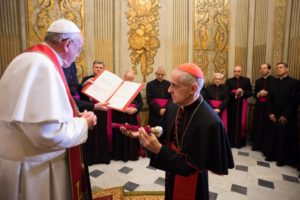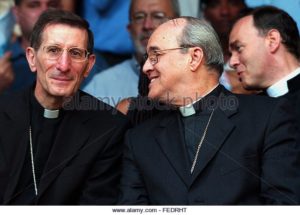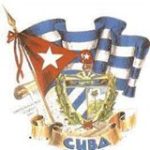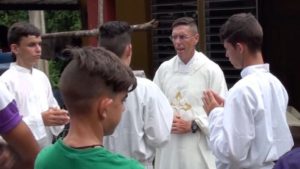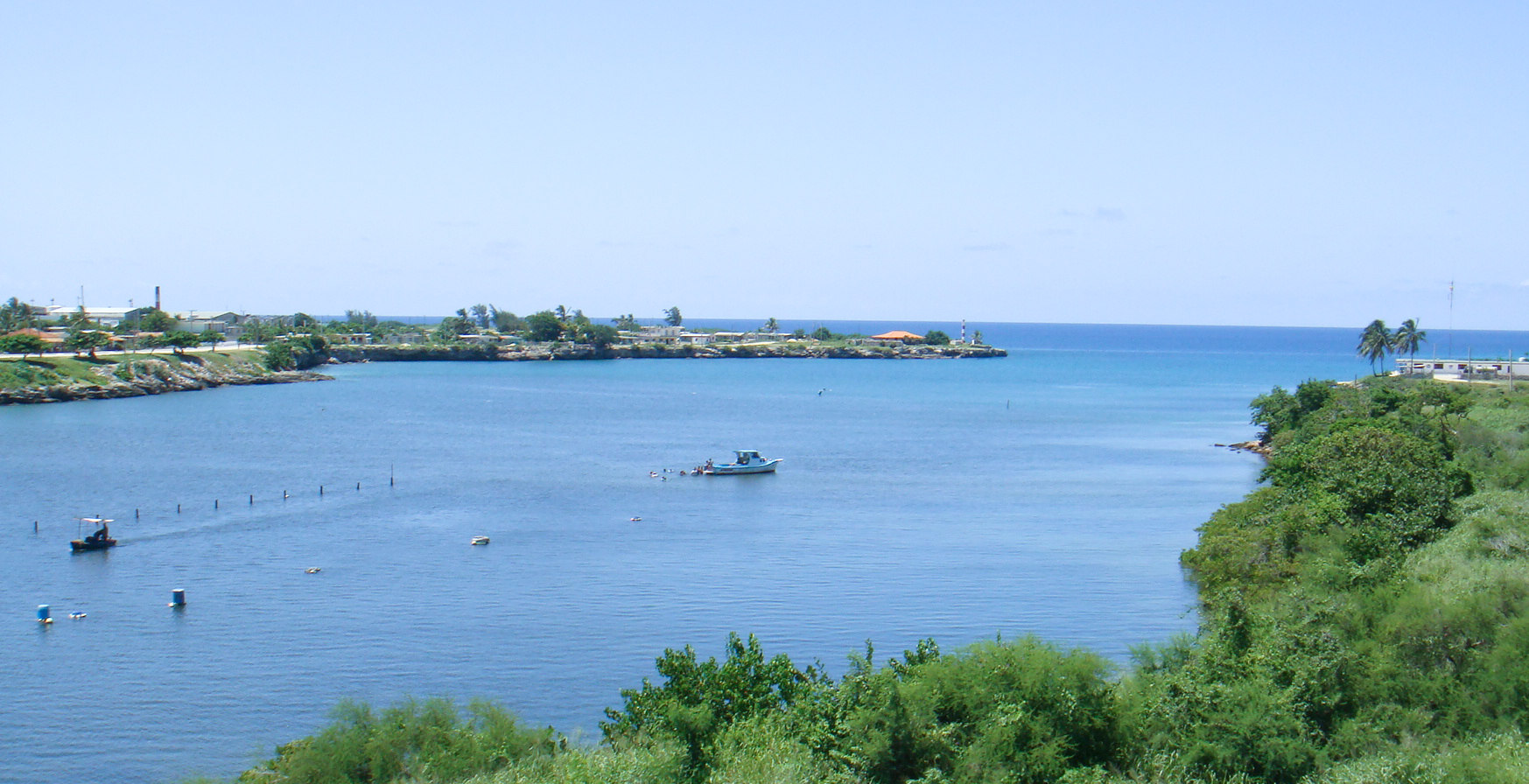Juan Yvo Urvoy, French priest in Placetas, claimed the role of the Church in a future Cuban transition.
French, lover of biking and priest in the parish San Atanasio de Placetas, Villa Clara, Juan Yvo Urvoy lives for a decade with the population of rural areas and takes the pulse of a reality that is by rewarding time and other alarming. In conversation with 14ymedio he talked about their projects and concerns.
Question: founded a club of cycling that has added members over the time. How does this combination of pastoral work and sports training?
Response. The club was founded nine years ago and involves boys who belong to the parish of St. Athanasius. They practice sports and through being educated with the discipline and the effort required cycling. We have the course weekly workouts, and whenever there is a school break or holiday we turns throughout the island. It serves to know a little better the country and promote coexistence and spirituality.
P. what led him to create something like this?
R. when arrived to Cuba the Bishop I said that had that do something for the males, because the Church of Cuba is very populated of women, grandmothers and girls, but is found few men. Cycling club helps boys to focus more on the community and live in it as your family.
Christians can not withdraw from politics but change it from its roots.
P. Placetas is a village that is home to important leaders of civil society are very active, as Jorge Luis Garcia Perez Antunez, for instance would relate to you with him?
R. Yes, we have been well, even when not is a parishioner. We share criteria and, as I said repeatedly to the authorities, I consider myself, as pastor of Placetas, pastor of all souls living there, so there is no repair in that I visit to anyone, even if you are not in the Christian community.
P. have ever felt you have tried to mute his views on the Cuban reality?
R no one silenced me, but I think that we are coming to the moments in which the Church has to speak out and be an instrument of this much-needed transition to the Cuban people.
A. the people of Cuba and us in the parish of Placetas were expecting another speech, another freedom of tone. We saw the Pope speak very freely in all the countries visited and it was very strange to see that in Cuba he was as well as braking. It was a little disappointing.
P. in the last decade it has helped boost in her parish several services and projects focused on the community. would detail them?
R. have an interned for males, a home of elderly with host of day and, especially, the review school, that is very important in the parish, in addition to others so many projects on orientation to the family and workshops of Couture for women.
My friends and my parishioners tell me: “don’t say that, because you’re going to discard of Cuba”. Fear is very present in the hearts of the people.
P. many priests and bishops Cuban say that they will occupy of the Church but not is put in political. would how sees that attitude?
R it is not only a position in the hierarchy of the Church, is something that also happens to the Cuban people, who are tired of politics after more than 50 years of the dictatorship. It is very common to hear people say that: “politics is crap”. The Christians say that they want to have clean hands and not getting into politics, which is a fundamental mistake. As Aristotle says, politics is the art of living and living together in society. Politics is something noble, that should encourage good men to constitute a society and a favorable environment so that man finds happiness. Christians can not withdraw from politics but change it from its roots.
P. would cre that so many Cuban priests callan to serious social problems and you, being a stranger, why speak out?
R perhaps because they were born in a context in which already are two or three generations under the Castro regime. That marks the mentality of the people. We have an advantage, coming from outside, with new eyes, and can also have elements of comparison, or even other types of training.
P. would run the risk of that it take of the country?
R my friends and my parishioners say: “no father, say that because you’re going to discard of Cuba”. Fear is very present in the hearts of the people.
It is time to tell Raúl Castro that if we are entering another special period is because socialism is not sustainable and should go to something else.
P. would have reacted the inhabitants of little squares to a possible deterioration of the economic situation?
R they are very worried and think that today’s generation is not ready to suffer as in the 1990s. Last Sunday I said at a mass that is the time that the Church calls Raúl Castro to a round table to tell you that if we are entering another special period it is because socialism is not sustainable and should go to something else.
The Church is ready to facilitate something like this: a real transition, to move to another political system that truly involves all Cubans. The Church has the role of see and speak well clear at this time.
Agencies/14ymedio/Jorge Guillén, Candelaria, Cuba/Internet Photos/Arnold Varona/TheCubanHistory.com
The Cuban History, Hollywood.
![]() DE LA IGLESIA CUBANA: CURA FRANCÉS CONVIVE CON LA POBLACIÓN EN EL CAMPO CUBANO.
DE LA IGLESIA CUBANA: CURA FRANCÉS CONVIVE CON LA POBLACIÓN EN EL CAMPO CUBANO.
Juan Yvo Urvoy, sacerdote francés en Placetas, reivindica el papel de la Iglesia en una futura transición cubana.
Francés, amante del ciclismo y sacerdote en la parroquia San Atanasio de Placetas, en Villa Clara, Juan Yvo Urvoy convive desde hace una década con la población de áreas rurales y le toma el pulso a una realidad que es por momento gratificante y en otros alarmante. En conversación con 14ymedio habló sobre sus proyectos y preocupaciones.
Pregunta: Fundó un club de ciclismo que ha sumado miembros a lo largo del tiempo. ¿Cómo lleva esa combinación de labor pastoral y entrenamiento deportivo?
Respuesta. El club fue fundado hace nueve años e involucra a los muchachos que pertenecen a la parroquia de San Atanasio. Practican algún deporte y a través de él se educan con la disciplina y el esfuerzo que requiere el ciclismo. Tenemos a lo largo del curso entrenamientos semanales, y cada vez que hay un receso escolar o vacaciones damos vueltas por toda la Isla. Sirve para conocer un poco mejor el país y fomentar la convivencia y la espiritualidad.
P. ¿Qué lo llevó a crear algo así?
R. Cuando llegué a Cuba el obispo me dijo que tenía que hacer algo para los varones, porque la Iglesia de Cuba está muy poblada de mujeres, abuelas y niñas, pero se encuentran pocos hombres. El club de ciclismo ayuda a que los muchachos se fijen más en la comunidad y vivan en ella como en su familia.
Los cristianos no pueden desentenderse de la política sino cambiarla desde sus raíces.
P. Placetas es un pueblo donde residen importantes líderes de la sociedad civil muy activos, como Jorge Luis García Pérez, Antúnez,por ejemplo. ¿Se relaciona usted con él?
R. Sí, nos llevamos bien, aun cuando no es un feligrés. Compartimos criterios y, como dije varias veces a las autoridades, me considero, como párroco de Placetas, pastor de todas las almas que allí viven, por lo que no hay reparo en que yo visite a quien quiera, incluso aunque no se encuentre en la comunidad cristiana.
P. ¿Ha sentido usted que han intentado silenciar sus opiniones sobre la realidad cubana?
R. Nadie me silenció, pero creo que estamos llegando a momentos en que la Iglesia tiene que alzar la voz y ser un instrumento de esta transición muy necesaria para el pueblo de Cuba.
R. El pueblo de Cuba y nosotros en la parroquia de Placetas esperábamos otro discurso, otra libertad de tono. Vimos al papa hablar muy libremente en todos los países que visitó y fue muy extraño ver que en Cuba estaba así como frenado. Fue un poquito decepcionante.
P. En la última década ha ayudado a impulsar en su parroquia varios servicios y proyectos enfocados en la comunidad. ¿Podría detallarlos?
R. Tenemos un internado para varones, un hogar de ancianos con acogida de día y, sobre todo, el repaso escolar, que es muy importante en la parroquia, además de otros tantos proyectos sobre orientación a la familia y talleres de costura para mujeres.
Mis amigos y mis feligreses me dicen: “no diga eso, porque van a botarlo de Cuba”. El miedo está muy presente en el corazón de la gente.
P. Muchos sacerdotes y obispos cubanos dicen que ellos se ocupan de la Iglesia pero no se meten en política. ¿Cómo ve esa actitud?
R. No es solo una situación en la jerarquía de la Iglesia, es algo que también le ocurre al pueblo cubano, que está harto de la política después de más de 50 años de esta dictadura. Es muy común escuchar aquí que la gente dice: “la política es una mierda”. Los cristianos aseguran que quieren tener las manos limpias y no meterse en política, lo que es un error fundamental. Como dice Aristóteles, la política es el arte de vivir y convivir en la sociedad. La política es algo noble, que debe animar a los hombres buenos para constituir una sociedad y un ámbito favorable para que el hombre encuentre la felicidad. Los cristianos no pueden desentenderse de la política sino cambiarla desde sus raíces.
P. ¿Por qué cre que tantos sacerdotes cubanos callan ante los graves problemas sociales y usted, que es un extranjero, alza la voz?
R. Tal vez porque ellos han nacido en un contexto en el que ya son dos o tres generaciones bajo el régimen castrista. Eso marca la mentalidad del pueblo. Nosotros tenemos una ventaja, llegando desde fuera, con ojos nuevos, y podemos también tener elementos de comparación, o incluso otro tipo de formación.
P. ¿Corre el riesgo de que lo echen del país?
R. Mis amigos y mis feligreses me dicen: “no diga eso padre, porque van a botarlo de Cuba”. El miedo está muy presente en el corazón de la gente.
Es el momento de decir a Raúl Castro que si estamos entrando en otro Periodo Especial es porque el socialismo no es sostenible y hay que pasar a otra cosa.
P. ¿Cómo han reaccionado los pobladores de Placetas ante un posible deterioro de la situación económica?
R. Están muy preocupados y piensan que la generación de hoy en día no está preparada para sufrir como en los años noventa. El domingo pasado dije en una misa que es el momento para que la Iglesia convoque a Raúl Castro a una mesa redonda para decirle que si estamos entrando en otro Periodo Especial es porque el socialismo no es sostenible y hay que pasar a otra cosa.
La Iglesia está lista para facilitar algo así: una verdadera transición, para pasar a otro sistema político que involucre en verdad a todos los cubanos. La Iglesia tiene el papel de ver y hablar bien claro en este momento.
Agencies/14ymedio/Jorge Guillén, Candelaria, Cuba/Internet Photos/Arnoldo Varona/TheCubanHistory.com
The Cuban History, Hollywood.



